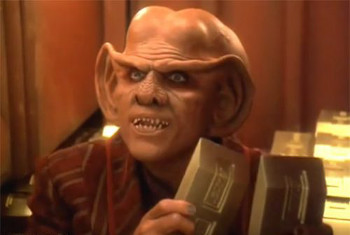
People often wonder how the economy could possibly work in Star Trek without money. But the premise of that question is wrong. There was money. The show just didn't like to talk about it much.
Among other casual references, Captain Picard once famously stated "money doesn't exist in the 24th century" in Star Trek VIII: First Contact. People often ask how it is possible for the Star Trek economy to exist without money.
But there's no way the Federation could possibly function as a society without some amount of capitalism. It's a lofty idea and it's terrific that Gene Roddenberry wanted us to imagine a future society that existed without money (maybe he was a fan of John Lennon's "Imagine"), but it's a completely implausible notion and the show itself constantly contradicts the idea.
There's money in the Federation. And it gets used to buy things.
Scarce things.

Desirable land would still be scarce
Want an apartment with a view overlooking the Golden Gate bridge in walking distance to Starfleet HQ? Get in line. With a population of tens of billions of people just in Earth's Solar System alone and probably hundreds of billions of people spread throughout the Federation, affordable San Francisco apartments are likely to be just as hard to come by as they are today. Without a doubt, the most desirable plots of land with the most desirable views would be traded on the private market.
As for Captain money-doesn't-exist-in-the-24th-century Picard, his family owns a vineyard in France for fuck's sake. The replicator isn't making more of those. And Captain Sisko's dad owns a restaurant in New Orleans. It's not as if you can walk up to a replicator and say, "restaurant, New Orleans, Cajun."
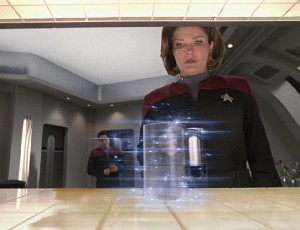
Energy would still be scarce
Antimatter and fusion power may sound limitless by today's standards, but never underestimate the power of demand. Anyone who's raised (or been) a mischievous teenager can imagine the unreasonable demands which could be placed on the energy grid by someone with too much time on their hands and not enough sense in their head.
Imagine your annoying 14 year old kid hacking your replicator and setting it on a continuous loop of "Tea, Earl Grey, hot" endlessly making the tea, then dematerializing it, and making it again. Now imagine millions of annoying teenagers all getting together on the Federation's equivalent to 4chan to download this hack to their replicators all at once. Now imagine how the Federation power grid could possibly cope.
It probably couldn't cope for the same reason you don't see everyone in the Federation using a site-to-site transporter for every trivial thing. Why bother getting off the couch to get the tea out of the replicator when you can beam it into your hands? Probably because the energy costs of doing that every day are absurd.
That brings us to...
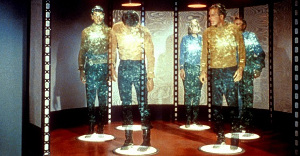
Transporter use is still scarce
Captain Sisko once told us he burned through a month's worth of "transporter credits" in a few days by simply beaming from San Francisco to New Orleans every day to have dinner with his dad. This fact strongly supports the idea that some things in the Federation consume so much energy that it's possible to reach tangible scarcity limits.
Not to mention...
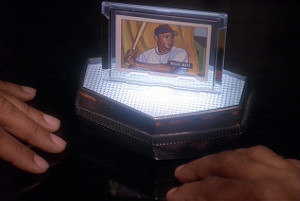
Some products cannot be replicated
There are several mentions on Star Trek of "industrial" replicators which implies that the energy requirements of replicating certain items approaches tangible scarcity limits.
We also know some items are simply impossible to replicate, such as Romulan ale, gold-pressed latinum, dilithium crystals, and antimatter. All were established by various episodes as impossible to replicate.
On top of that some items have a certain history or were hand-crafted and thus carry an intangible, but socially recognized value. Replicating your own Mona Lisa is no substitute for owning the original.
Likewise, as we saw in the show itself, there's no substitute for owning an original mint-condition Willie Mays rookie year baseball card. And guess what Jake Sisko needed to buy that? Money.

Starships would still be scarce
It's reasonable to assume many of the raw materials involved in starship construction such as antimatter fuel and possibly some precious and/or refined metals are not possible to replicate or at the very least require industrial replicators and therefore require nontrivial amounts of energy to produce.
In addition, starships require assembly, which is well established on Star Trek to be a scarce service. We have seen plenty of episodes which depict it taking a very long time and a lot of qualified people to assemble starships. Moreover, during the Dominion War it was well established that the Federation was experiencing both a manpower and a starship shortage.
The starship shortage was also implied by Seven of Nine's backstory. Her parents had to lobby hard to be given a starship with which to conduct their scientific expedition. Then when they went rogue with it and deviated from their flight plan, the Federation got mighty pissed with them. All of this suggests a scarcity of starships.
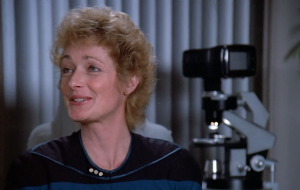
Certain services like healthcare would still be scarce
With so many billions upon billions of people in the Federation, the demand for an army of qualified doctors would be high. And everything we know about Star Trek tells us that medicine is still just as laborious and difficult a profession in the 24th century as it is in the 21st.
A lot of labor would no longer be scarce and the vast majority of people probably would not work. But jobs which require highly specialized skills that take tons of training to get competent at would still be scarce relative to the population and highly valued. Being a doctor is one of those jobs. Sure, the Emergency Medical Hologram shows promise to potentially automate much of this industry too, but Voyager establishes enough limitations on this technology that it's clearly no substitute for a humanoid doctor yet.
Another one of those jobs would be war. The Federation fights plenty of wars. It's hard to imagine a world which does not compensate soldiers who fight and die on behalf of their nation, especially when so many other goods and services are still scarce.
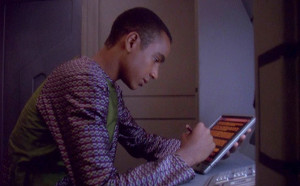
Performing scarce services is how you get paid
Want a nice apartment with a view of the Golden Gate? Want to own a restaurant in New Orleans? Want your own personal holosuite? Want a vineyard in France? Want your own personal starship? Want to consume scarce services? Then perform other services that are in high demand. Become a doctor. Help build starships. Produce original creative works on commission. Sell off your transporter credits. Engage in scientific research. Fight in the next war against the enemies of the Federation. And probably so much more.
Without a doubt, basic needs in the Federation are fully socialized. Food is limitless thanks to replicators, shelter (especially in undesirable locations) probably well exceeds demand, and there are probably enough qualified doctors to go around to meet your healthcare needs. The Federation most likely has its shit together too unlike the United States and probably has implemented a single-payer healthcare system.
So there's certainly no wage slavery in the Federation. That's how Jake Sisko can sit around being an amateur writer all day without worrying too much about poverty. In that regard, use of money is truly optional. It's possible even the vast majority of the population never uses it for anything.
But without a doubt the Federation still has a capitalist economy that deals in what few resources are still scarce. If Jake Sisko wants a French vineyard or a San Francisco apartment with a view, he will most likely will need to sell his scarce labor on a competitive market. And that won"t be easy. Medical school will still be hard. But I bet being a doctor pays more than being an amateur writer.